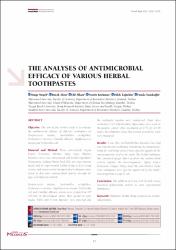The analyses of antimicrobial efficacy of various herbal toothpastes
Citation
Meşeli S., Aksu B., Alkan E., Korkmaz N., Tağtekin D., Yanıkoğlu F. The analyses of antimicrobial efficacy of various herbal toothpastes (2025). Nobel Medicus, 21(1):13-21.Abstract
Objective: The aim of this in-vitro study is to evaluate the antibacterial efficacy of different toothpastes on Streptococcus mutans, Lactobacillus acidophilus, Actinomyces viscosus, Candida albicans, Staphylococcus aureus and Escherichia coli. Material and Method: Three conventional (Signal Expert Protection, Klorhex Daily Care, Klorhex Intensive Care), two conventional with herbal ingredients (Gumgumix, Colgate Hemp Seed Oil), one experimental based, and six experimental herbal (hemp seed oil, hemp extract, and various metal nanoparticles) toothpastes were tested to determine antimicrobial activity through the agar-well diffusion method. Streptococcus mutans, Lactobacillus acidophilus, Actinomyces viscosus, Staphylococcus aureus, Escherichia coli and Candida albicans strains were prepared at 108 CFU/mL in physiological saline, then spread on agar media. Wells with 6 mm diameter were punched and the toothpaste samples were transferred. Paper discs containing 0.2% chlorhexidine digluconate were used as the positive control. After incubation at 37°C for 24-48 hours, the inhibition zones that formed around the wells were measured. Results: It was observed that Klorhex Intensive Care and one experimental toothpaste (containing Ag nanoparticle, hemp oil, and hemp extract) were effective against all the microorganisms used in the study. The herbal toothpaste that contained ginger didn’t perform any antimicrobial activity against the microorganisms. Signal Expert Protection, Colgate Hemp Seed Oil, and Klorhex Daily Care toothpastes were effective against all of the study’s microorganisms except E. coli. Conclusion: The addition of hemp seed oil and extract increased antibacterial activity in some experimental toothpastes. Amaç: Bu in vitro çalışmanın amacı, farklı diş
macunlarının Streptococcus mutans, Lactobacillus
acidophilus, Actinomyces viscosus, Candida albicans,
Staphylococcus aureus ve Escherichia coli üzerindeki
antibakteriyel etkinliğini değerlendirmektir.
Materyal ve Metot: Üç geleneksel (Signal Expert
Protection, Klorhex Günlük Bakım, Klorhex Yoğun
Bakım), iki bitkisel içerikli geleneksel (Gumgumix,
Colgate Hemp), bir deneysel baz ve altı deneysel
bitkisel (kenevir tohumu yağı, kenevir ekstraktı ve
farklı metal nanopartiküller) diş macunu, agar-well
difüzyon yöntemi yoluyla antimikrobiyal aktiviteyi
belirlemek için test edildi.
Streptococcus mutans, Lactobacillus acidophilus,
Actinomyces viscosus, Staphylococcus aureus,
Escherichia coli ve Candida albicans suşları fizyolojik
salin içerisinde 108
CFU/mL'de hazırlandı, ardından agar ortamına yayıldı. 6 mm çapında kuyucuklar
açılarak diş macunu örnekleri aktarıldı. Pozitif kontrol
olarak %0,2 klorheksidin diglukonat içeren kağıt
diskler kullanıldı. 37°C'de 24-48 saat inkübasyonun
ardından kuyucukların etrafında oluşan inhibisyon
zonları ölçüldü.
Bulgular: Klorhex Yoğun Bakım ve bir adet deneysel
diş macununun (Ag nanopartikülü, kenevir yağı ve
kenevir ekstraktı içeren) çalışmada kullanılan tüm
mikroorganizmalara karşı etkili olduğu gözlendi.
Zencefil içeren bitkisel diş macunu mikroorganizmalara
karşı herhangi bir antimikrobiyal aktivite göstermedi.
Signal Expert Protection, Colgate Hemp Seed Oil ve
Klorhex Günlük Bakım diş macunları, E. coli dışında
çalışmadaki tüm mikroorganizmalara karşı etkiliydi.
Sonuç: Kenevir tohumu yağı ve ekstraktının eklenmesi
bazı deneysel diş macunlarında antibakteriyel aktiviteyi
artırdı.
Source
Nobel MedicusVolume
21Issue
1URI
https://www.nobelmedicus.com/tr/article/807/farkli-bitkisel-dis-macunlarinin-antimikrobiyal-etkinliginin-analizihttps://hdl.handle.net/20.500.12780/1148


















